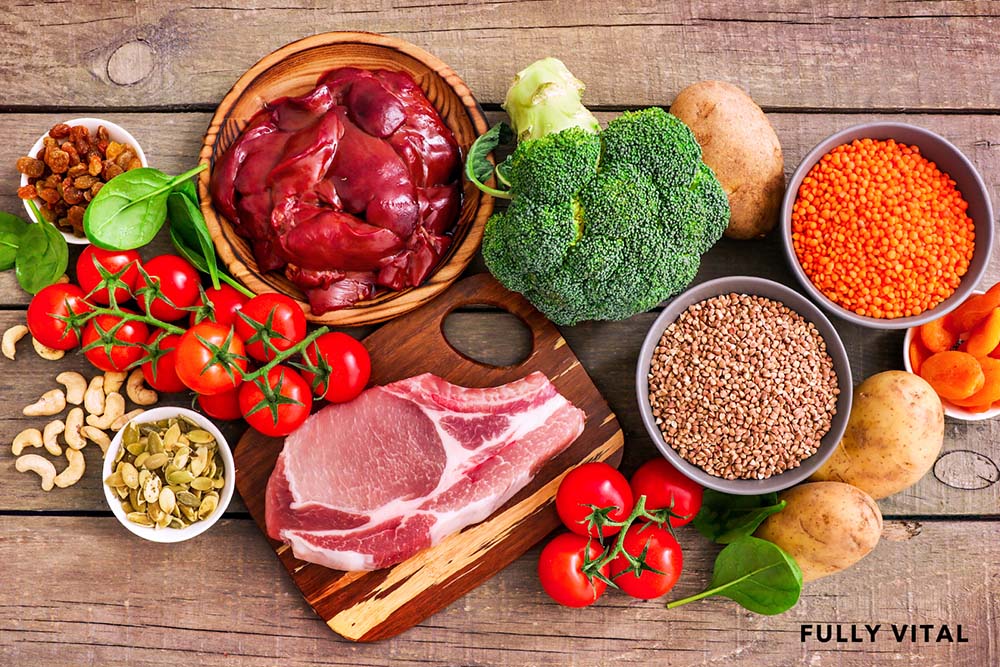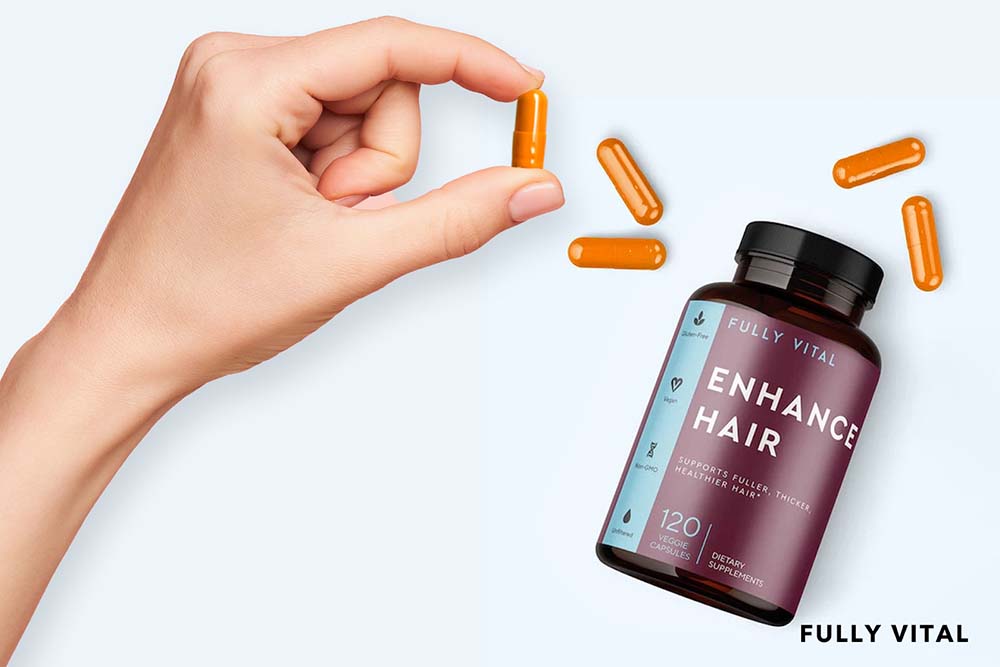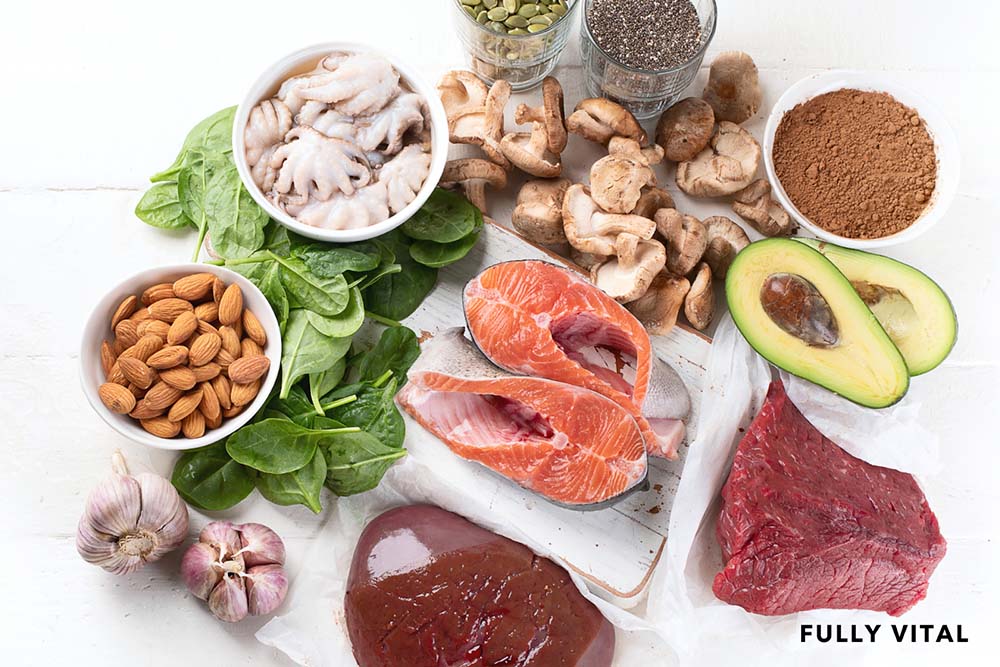
Iron: The Essential Nutrient for Hair Growth
Iron is a vital nutrient that plays a crucial role in maintaining healthy hair growth.
As a woman with various hair types, stimulating hair growth is likely one of your top priorities.
In this article, we will delve into the significance of iron, how it works, its benefits, and any potential downsides.
Additionally, we will explore alternative options for those seeking alternatives to iron.
Let's get started!

I LOVE MY HAIR NOW
FullyVital hair serum and hair vitamins made tremendous improvements in my hair. I truly love my hair now.
Dorit S.,
What is Iron?
Iron is a mineral that is essential for numerous bodily functions, including hair growth.
It is a key component of hemoglobin, a protein responsible for transporting oxygen to various parts of the body, including the hair follicles.
Without adequate iron levels, the hair follicles may not receive sufficient oxygen, which can lead to hair loss and stunted growth.

Why is Iron Important?
Iron plays a vital role in maintaining overall health, and its significance extends to hair growth as well. Here are some reasons why iron is crucial for healthy hair:(1)
Oxygen Transport
Iron helps in the transportation of oxygen to the hair follicles, promoting hair growth and preventing hair loss.
Cell Regeneration
Iron is involved in the production of new cells, including those in the hair follicles, aiding in their growth and regeneration.
Nutrient Absorption
Iron facilitates the absorption of other essential nutrients necessary for healthy hair, such as vitamins and minerals.
How Does Iron Work?
Iron works by supporting the production of hemoglobin, which carries oxygen to the hair follicles.
It aids in the synthesis of DNA, the genetic material responsible for cell growth and division.
Additionally, iron assists in the conversion of nutrients into energy, providing the necessary fuel for hair growth.
What are the Benefits of Iron?
Ensuring adequate iron levels in your body can offer several benefits for your hair growth journey.
Here are some advantages:
Promotes Hair Growth
Sufficient iron intake supports the growth of strong, healthy hair.
Prevents Hair Loss
Iron deficiency can lead to hair loss, and maintaining optimal iron levels can help prevent this problem.
Enhances Hair Health
Iron contributes to the overall health and vitality of your hair, making it less prone to damage and breakage.
Are There Any Downsides to Iron?
While iron is essential for hair growth, excessive or inappropriate intake can have adverse effects.
It is crucial to strike the right balance. Here are a few downsides to consider:
Iron Overload
Consuming excessive iron supplements without medical supervision can lead to iron overload, which may cause health complications.
Interactions with Medications
Iron supplements can interact with certain medications, so it is essential to consult with a healthcare professional before starting any iron supplementation.
What are the Alternatives to Iron?
If you are unable to incorporate iron-rich foods into your diet or have difficulty absorbing iron, there are alternative options to consider.
Here are some alternatives to iron:
Biotin
Biotin, a B-vitamin, is known for its positive impact on hair health and growth.
Zinc
Zinc is a mineral that supports hair growth by enhancing cell reproduction and tissue repair.
Vitamin C
Vitamin C aids in the absorption of iron and promotes collagen production, which contributes to hair strength and elasticity.
How Does Iron Support Hair Growth?
Iron plays a crucial role in supporting hair growth by:
- Enhancing oxygen supply to the hair follicles, promoting healthy hair growth.
- Aiding in the synthesis of DNA, which is essential for cell growth and division.
- Assisting in the conversion of nutrients into energy, providing fuel for hair growth.
Is Iron Deficiency Common?
Iron deficiency is a prevalent condition that can affect hair growth.
It is especially common in women due to factors such as menstruation and pregnancy.
Identifying and addressing iron deficiency is crucial for maintaining optimal hair health.
Signs of Iron Deficiency
Look out for these signs that may indicate iron deficiency:
- Fatigue and weakness
- Pale skin
- Brittle nails
- Cold hands and feet
- Shortness of breath
- Frequent infections
- Unexplained hair loss
Consult a healthcare professional if you suspect iron deficiency.
Can Iron Alone Promote Hair Growth?
While iron is an important nutrient for hair growth, it is not the sole factor. Achieving healthy hair growth requires a holistic approach that includes:
- A balanced diet rich in essential nutrients, including iron.
- Proper hair care routine, including gentle handling, avoiding excessive heat styling, and using suitable hair products.
- Adequate hydration and overall healthy lifestyle habits.
How Much Iron Is Needed For Hair Growth?
The amount of iron needed for optimal hair growth varies depending on factors such as age, gender, and overall health.
The recommended daily intake of iron for adult women is approximately 18 mg.
However, it is important to note that individual requirements may differ, and it is best to consult with a healthcare professional to determine the appropriate dosage for your specific needs.
Can I Take Iron Tablets For Hair Growth?
Iron tablets can be beneficial for hair growth, especially if you have been diagnosed with iron deficiency or have low iron levels.
However, it is essential to consult with a healthcare professional before starting any iron supplementation.
They can evaluate your iron levels through blood tests and provide guidance on the appropriate dosage and duration of iron supplementation for your hair growth goals.
Can Lack Of Iron Cause Hair Loss?
Yes, a lack of iron can contribute to hair loss. Iron deficiency disrupts the oxygen supply to the hair follicles, leading to weakened hair and potential hair loss.
It is crucial to maintain adequate iron levels to support healthy hair growth.
If you suspect iron deficiency as a potential cause of your hair loss, it is advisable to consult with a healthcare professional for proper diagnosis and treatment.
Can Iron Make Hair Thicker?
Iron plays a significant role in maintaining the overall health and thickness of hair.
Adequate iron levels support the transportation of oxygen to the hair follicles, promoting hair growth and preventing hair thinning.
However, it is important to note that iron alone may not be the sole factor determining hair thickness.
A well-balanced diet, proper hair care routine, and overall health also contribute to achieving thicker and healthier hair.(2)
Does Iron Help Skin And Hair?
Yes, iron has benefits for both skin and hair.
Here's how iron contributes to the health of your skin and hair:
Hair Health
Iron supports the oxygen supply to the hair follicles, promoting hair growth and preventing hair loss.
It also aids in the production of new cells, contributing to the regeneration and maintenance of healthy hair.
Skin Health
Iron is involved in collagen production, a protein that supports skin elasticity and vitality.
Adequate iron levels help maintain healthy skin, preventing issues such as dryness, dullness, and premature aging.
Unlock the Power of Youthful Hair with Fully Vital!Experience the transformative benefits of our science-backed hair growth products. At Fully Vital, we understand the importance of maintaining a healthy relationship with your locks. That's why our range of hair growth solutions is specifically formulated to combat the aging of your hair and revitalize its natural beauty. Discover the key features and benefits of our products:
Experience the transformative power of Fully Vital's hair growth products and embark on a journey to regain youthful, healthy hair. Don't let age define your locks – take control and unlock the potential for beautiful, revitalized hair today! |
Final Thoughts On Iron
Iron plays a vital role in hair growth and overall hair health.
Adequate iron levels are essential for promoting strong, luscious locks and preventing hair loss.
From understanding the importance of iron and how it works to exploring alternative options and addressing frequently asked questions, we have covered the key aspects of iron in relation to hair growth.
At Fully Vital, we recognize the significance of iron in maintaining a healthy relationship with your hair.
Our range of hair growth products is specifically designed to combat hair aging and nurture your locks.
Whether you're seeking to address iron deficiency or enhance the natural growth and vitality of your hair, our products are formulated to support your hair growth journey.
Frequently Asked Questions about Iron
Can iron deficiency cause hair loss?
Yes, iron deficiency can lead to hair loss as it disrupts the oxygen supply to the hair follicles, resulting in weakened hair and potential hair loss.
How much iron should I consume daily for optimal hair growth?
The recommended daily intake of iron varies depending on factors such as age and gender.
It is best to consult with a healthcare professional to determine the right dosage for your specific needs.
Can I get enough iron through my diet alone?
While iron-rich foods can contribute to your iron intake, some individuals may require iron supplementation to meet their daily requirements.
A healthcare professional can provide guidance based on your specific circumstances.
Are there any vegetarian or vegan sources of iron?
Yes, vegetarian and vegan sources of iron include leafy green vegetables (such as spinach and kale), legumes (such as lentils and chickpeas), tofu, nuts, and seeds.
Can iron supplements cause constipation?
Iron supplements can sometimes lead to constipation as a side effect.
Drinking plenty of water, increasing fiber intake, and taking the supplement with food can help alleviate this issue.
If it persists, consult with a healthcare professional.
Can I take iron supplements if I am pregnant or breastfeeding?
Pregnant and breastfeeding women may require additional iron due to increased blood volume.
It is important to consult with a healthcare professional before starting any iron supplementation during pregnancy or while breastfeeding.(3)
Is it safe to iron hair everyday?
It is generally not recommended to iron your hair every day.
Excessive heat styling, including the use of flat irons, can cause damage to the hair over time.
Frequent heat styling can lead to dryness, brittleness, and breakage.
It is advisable to limit the use of heat styling tools and incorporate protective measures such as using heat protectant sprays and lower heat settings when styling your hair with an iron.
How can I tell if I'm low on iron?
Several signs and symptoms may indicate low iron levels in the body. These can include:
- Fatigue and weakness
- Pale skin
- Brittle nails
- Cold hands and feet
- Shortness of breath
- Frequent infections
- Unexplained hair loss
If you suspect you may be low on iron, it is best to consult with a healthcare professional who can assess your iron levels through blood tests and provide appropriate guidance and treatment.
Do irons damage hair?
Yes, using flat irons and other heat styling tools can potentially damage your hair.
Excessive heat can strip away moisture from the hair strands, making them dry and brittle.
This can lead to hair breakage and split ends.
It is important to use heat styling tools in moderation, apply heat protectant products, and follow proper techniques to minimize the risk of hair damage.
What foods are high in iron?
Various foods are rich sources of iron. Some iron-rich foods include:
Red meat (beef, lamb)
Poultry (chicken, turkey)
Fish and seafoodLegumes (lentils, chickpeas, kidney beans)
Tofu and soy products
Spinach and other leafy green vegetables
Nuts and seeds (such as almonds, pumpkin seeds)
Fortified cereals and bread
Dried fruits (apricots, raisins)
Incorporating a diverse range of these iron-rich foods into your diet can help maintain adequate iron levels in your body.
How long does iron last on hair?
Ironing the hair with a flat iron typically provides temporary results.
The duration for which the effects of ironing last on the hair can vary depending on factors such as hair type, texture, and environmental conditions.
Generally, the sleekness and straightness achieved through ironing may last until the next wash or until the hair comes in contact with moisture.
It is important to note that repeated ironing without proper hair care practices can contribute to hair damage over time.
Sources:
- Abbaspour, N., Hurrell, R., & Kelishadi, R. (2014). Review on iron and its importance for human health. Journal of Research in Medical Sciences : The Official Journal of Isfahan University of Medical Sciences, 19(2), 164–174. https://www.ncbi.nlm.nih.gov/pmc/articles/PMC3999603/
- Abbaspour, N., Hurrell, R., & Kelishadi, R. (2014). Review on iron and its importance for human health. Journal of Research in Medical Sciences : The Official Journal of Isfahan University of Medical Sciences, 19(2), 164–174. https://www.ncbi.nlm.nih.gov/pmc/articles/PMC3999603/
- Information, N. C. for B., Pike, U. S. N. L. of M. 8600 R., MD, B., & Usa, 20894. (2018). Pregnancy and birth: Do all pregnant women need to take iron supplements? In www.ncbi.nlm.nih.gov. Institute for Quality and Efficiency in Health Care (IQWiG). https://www.ncbi.nlm.nih.gov/books/NBK279574/







